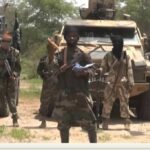We Were Forced to Swear an Oath of Secrecy Regarding Boko Haram Terrorists
We Were Forced to Swear an Oath of Secrecy Regarding Boko Haram Terrorists

A former government official has revealed the reasons behind the persistence of Boko Haram insurgency in Nigeria’s North-east.
Gavs Katiya, a retired Director of the National Directorate of Employment (NDE), stated that he and officials from the National Orientation Agency (NOA) were compelled to take an oath of secrecy before engaging with repentant Boko Haram terrorists in the region.
During an appearance on Channels TV’s Sunrise Daily, Mr. Katiya shared his experiences. He explained that the NDE, established in 1986 to address youth unemployment through skill acquisition programs, played a role in interacting with former Boko Haram fighters who had laid down their arms.
Since the insurgency began around 2009, Boko Haram has been responsible for the deaths of tens of thousands, including over 300,000 children, and has displaced numerous others. In March 2018, then-President Muhammadu Buhari announced the government’s willingness to accept the unconditional surrender of Boko Haram members.
Mr. Katiya, who is from Gwoza Local Government Area in Borno State, mentioned that his deployment to the North-east provided him and NOA officials the opportunity to work with repentant fighters. “The first batch of 95 repentant Boko Haram fighters was brought to my office while I was still the director at NDE. We were tasked with training them in various skills,” he recalled. However, before engaging with them, they had to swear an oath of secrecy, ensuring they would not disclose any identities of the former fighters.
He did not specify who mandated this oath.
Now retired, Mr. Katiya leads the Gwoza Resettlement Initiative, an organization focused on resettling refugees displaced by terrorism in Gwoza, a town on the Nigeria-Cameroon border that recently faced another attack from suspected Boko Haram members.
Mr. Katiya highlighted that the insurgency thrives partly because many residents join Boko Haram as a means of livelihood. He noted that 70 out of the 95 repentant fighters he worked with were from Gwoza, including individuals he personally knew.
Security expert Patrick Agbambu commented on the practice, stating that while both orthodox and unorthodox methods can be employed for peace, forcing oaths of secrecy is not standard in security protocols. He mentioned that despite his own interactions with former Boko Haram fighters, he had never been required to take such an oath. “It’s not a standard practice in security to compel individuals to swea
r oaths,” he said.
TRENDING SONGS
 NPMA Appeals to Nigerian Government for Compensation After Lagos Market Fire
NPMA Appeals to Nigerian Government for Compensation After Lagos Market Fire
 Rest Every Four Hours, FRSC Issues Safety Guide for Fasting Motorists
Rest Every Four Hours, FRSC Issues Safety Guide for Fasting Motorists
 NNPC Boss Ojulari Bags UK Energy Institute Fellowship
NNPC Boss Ojulari Bags UK Energy Institute Fellowship
 Shock in Anambra: Bride Disappears Moments Before Wedding
Shock in Anambra: Bride Disappears Moments Before Wedding
 Nigerian Woman Returns ₦330 Million Accidentally Credited to Her Account
Nigerian Woman Returns ₦330 Million Accidentally Credited to Her Account
 APC Don Reach Morocco?’ VeryDarkMan Reacts to Seyi Tinubu Poster
APC Don Reach Morocco?’ VeryDarkMan Reacts to Seyi Tinubu Poster
 Bride Breaks Down in Tears as Wedding Meals Were Kept Secretly While Guests Go Home Hungry
Bride Breaks Down in Tears as Wedding Meals Were Kept Secretly While Guests Go Home Hungry
 Odogwu by Day, Robber by Night: How Marriage Joy Turned Into Tragedy
Odogwu by Day, Robber by Night: How Marriage Joy Turned Into Tragedy
 Nigerian Officials Allegedly Pocket N4–6B Weekly Through Smuggling Cartels at Seme–Badagry Border
Nigerian Officials Allegedly Pocket N4–6B Weekly Through Smuggling Cartels at Seme–Badagry Border
 Ahmad Yerima: Naval Officer to Face No Sanctions After Clash with Wike – Matawalle
Ahmad Yerima: Naval Officer to Face No Sanctions After Clash with Wike – Matawalle
Share this post with your friends on ![]()













